"I do not want to go into details on what these measures will be like in advance. In the past, there were cases when we took retaliatory measures but did not announce them. This is also a good way to make it as a fait accompli when our US colleagues come to visit Russia on a mission or privately. It is not necessarily what we will do, there are many [options]. It is important to understand the context and the current priorities. But the measures will be taken; we are not avoiding this work," Ryabkov told reporters.
This new wave of sanctions followed the West's allegations on Russia sponsoring malign cyberactivity, which Moscow considered to be groundless. Kremlin spokesman Dmitry Peskov has said that the West did not have the weakest argument to substantiate its claims, adding that such ill-founded accusations have been completely devalued.
READ MORE: EU's Anti-Russian Sanctions a 'Dictate Imposed by Washington' — Analyst
Relations between Russia and the United States have deteriorated amid the crisis in Ukraine in 2014. Washington has introduced several rounds of anti-Russia sanctions after Crimea's reunification with Russia and the latter's alleged involvement in the Ukraine conflict. Russia has refuted all the accusations and taken retaliatory economic restrictions.





